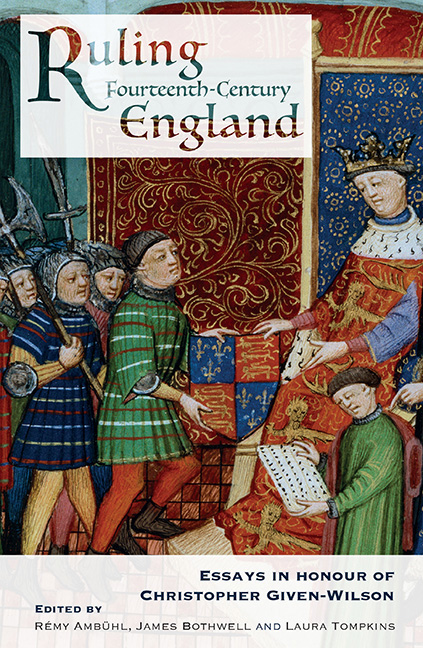Book contents
- Frontmatter
- Contents
- Contributors
- Abbreviations
- Introduction
- The Efficiency of English Royal Administration in the Last Years of Edward I
- Government and Market in the Early Fourteenth Century
- Kings' Clerks: The Essential Tools of Government
- Edward II: Favourites, Loyalty and Kingship
- The Perils of Lordship: The Life and Death of William Tuchet (c. 1275–1322)
- ‘War’, ‘Rebellion’ or ‘Perilous Times’? Political Taxonomy and the Conflict in England, 1321–2
- The Carlisle Roll of Arms and the Political Fabric of Military Service under Edward III
- What's in a Title? Comital Development, Political Pressures and Questions of Purpose in Fourteenth-Century England
- Edward the Black Prince: Lordship and Administration in the Plantagenet Empire
- ‘Said the Mistress to the Bishop’: Alice Perrers, William Wykeham and Court Networks in Fourteenth-Century England
- The Politics of Surrender: Treason, Trials and Recrimination in the 1370s
- Richard II in the Mirror of Christendom
- Bibliography
- Index
- Tabula Gratulatoria
Introduction
Published online by Cambridge University Press: 18 September 2019
- Frontmatter
- Contents
- Contributors
- Abbreviations
- Introduction
- The Efficiency of English Royal Administration in the Last Years of Edward I
- Government and Market in the Early Fourteenth Century
- Kings' Clerks: The Essential Tools of Government
- Edward II: Favourites, Loyalty and Kingship
- The Perils of Lordship: The Life and Death of William Tuchet (c. 1275–1322)
- ‘War’, ‘Rebellion’ or ‘Perilous Times’? Political Taxonomy and the Conflict in England, 1321–2
- The Carlisle Roll of Arms and the Political Fabric of Military Service under Edward III
- What's in a Title? Comital Development, Political Pressures and Questions of Purpose in Fourteenth-Century England
- Edward the Black Prince: Lordship and Administration in the Plantagenet Empire
- ‘Said the Mistress to the Bishop’: Alice Perrers, William Wykeham and Court Networks in Fourteenth-Century England
- The Politics of Surrender: Treason, Trials and Recrimination in the 1370s
- Richard II in the Mirror of Christendom
- Bibliography
- Index
- Tabula Gratulatoria
Summary
Until relatively recently, the fourteenth century in England was considered something of a no man's land, caught between the intellectual and political turbulence of the eleventh, twelfth and thirteenth centuries and the upheavals and remakings of the fifteenth and sixteenth. The Norman Conquest, the Anarchy, Magna Carta, the Barons’ Wars, the Wars of the Roses, the Tudors, and the Reformation were all important foci for those interested in leadership and authority. By contrast, the study of the governance and the exercise of power in the fourteenth century was overshadowed: unsurprising considering the comparatively brief amount of time spent engaged in civil war over the course of the century, and the relatively laconic contemporary record of more developed political ideas. There were, of course, the ground-breaking modern studies by the likes of Thomas Frederick Tout, Maude Clarke and Bertie Wilkinson on government and administration, but their work tended to look back to the twelfth and thirteenth century for its inspiration, and they were, of course, of a much earlier generation of historians – one could argue the surveyors of fourteenth-century power dynamics, rather than the settlers.
Instead, the most notable topics for scholarly and popular attention in the century tended to be connected with the economy and society, especially the effects of recurrent outbreaks of the Black Death starting in 1348, and the origins and impact of the Rising of 1381. Both attracted scholars due to their importance for medieval society as a whole, and had inbuilt debates which would guarantee their relevance for years to come. Even when theories involving politics and the exercise of power in the study of fourteenth-century England did emerge, they tended to look inward for their relevance, with their importance arising from events and personalities rather than wider ranging processes. The most notable of these, the depositions of 1327 and 1399, while sparking interest in ideas of fourteenth-century kingship, were more often than not isolated within the reigns they brought to an end. On a larger stage, the Hundred Years War held the attention of scholars and the wider public in part because of the fame of the victories at Crecy and Poitiers, but also because of the strength of characters such as the Black Prince and Edward III.
- Type
- Chapter
- Information
- Ruling Fourteenth-Century EnglandEssays in Honour of Christopher Given-Wilson, pp. 1 - 20Publisher: Boydell & BrewerPrint publication year: 2019

